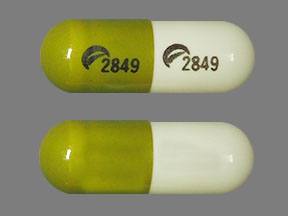
Fluvoxamine ER Coupons & Savings Card – Discount Prices from $55.03
Fluvoxamine is a medication primarily used to treat obsessive-compulsive disorder (OCD) in adults and children aged 8 and older. It belongs to a group of medications called selective serotonin reuptake inhibitors (SSRIs). By increasing serotonin levels in the brain, fluvoxamine helps alleviate OCD symptoms. Typically, it is taken orally once or twice a day, depending on the prescribed form, either immediate-release or extended-release. While effective, fluvoxamine may cause side effects such as nausea, sleep disturbances, and headaches. Always consult with your healthcare provider for personalized medical advice before starting any new medication.
Our coupons are free to use. Before paying, show the pharmacist your Fluvoxamine ER savings card to get your free discount. Use our filters below to edit the prescription box to match your needs. The Fluvoxamine ER prices will update based on your prescription needs. Above our Fluvoxamine ER coupons, you can change your location to see pharmacy prices and costs in other areas. We're here to help you buy Fluvoxamine ER at the lowest price with our prescription discount card.
My prescription
Edit
150MG, Fluvoxamine ER (30 Capsule Extended Release 24 Hours)
Select pharmacy

CVS
$103.85
COUPON PRICE
Walgreens
$55.03
COUPON PRICE
Albertsons
$173.71
COUPON PRICE
Walmart
$229.14
COUPON PRICEFluvoxamine ER savings card
Show this card to your pharmacist
Walgreens
$55.03
BIN
ID
PCN
GRP
015995
LHKPX743805
GDC
DR33
Powered by
Fluvoxamine is a medication primarily used to treat obsessive-compulsive disorder (OCD) in adults and children aged 8 and older. It belongs to a group of medications called selective serotonin reuptake inhibitors (SSRIs). By increasing serotonin levels in the brain, fluvoxamine helps alleviate OCD symptoms. Typically, it is taken orally once or twice a day, depending on the prescribed form, either immediate-release or extended-release. While effective, fluvoxamine may cause side effects such as nausea, sleep disturbances, and headaches. Always consult with your healthcare provider for personalized medical advice before starting any new medication.
Our coupons are free to use. Before paying, show the pharmacist your Fluvoxamine ER savings card to get your free discount. Use our filters below to edit the prescription box to match your needs. The Fluvoxamine ER prices will update based on your prescription needs. Above our Fluvoxamine ER coupons, you can change your location to see pharmacy prices and costs in other areas. We're here to help you buy Fluvoxamine ER at the lowest price with our prescription discount card.
More prescriptions for obsessive-compulsive disorder
coupons from$20.66Save 83%
coupons from$10.54Save 69%
coupons from$20.66Save 83%
coupons from$10.54Save 69%
coupons from$7.16Save 92%
coupons from$10.85Save 90%
coupons from$31.87Save 77%
coupons from$424.84Save 17%
More prescriptions for obsessive-compulsive disorder
Anafranil Save 83%coupons from $20.66
Zoloft Save 69%coupons from $10.54
Clomipramine Save 83%coupons from $20.66
Sertraline Save 69%coupons from $10.54
Fluoxetine Save 92%coupons from $7.16
Prozac Save 90%coupons from $10.85
Fluvoxamine Save 77%coupons from $31.87
Pexeva Save 17%coupons from $424.84
Fluvoxamine ER dosage forms
Use our Fluvoxamine ER 100MG coupon with prices from $92.86 for 30 Capsule Extended Release 24 Hours. You can also use our Fluvoxamine ER 150MG coupon with prices from $103.85 for 30 Capsule Extended Release 24 Hours.
Dosage Quantity Price from Per unit 100MG 30 Capsule Extended Release 24 Hours $92.86 $3.10 150MG 30 Capsule Extended Release 24 Hours $103.85 $3.46
| Dosage | Quantity | Price from | Per unit |
|---|---|---|---|
| 100MG | 30 Capsule Extended Release 24 Hours | $92.86 | $3.10 |
| 150MG | 30 Capsule Extended Release 24 Hours | $103.85 | $3.46 |
